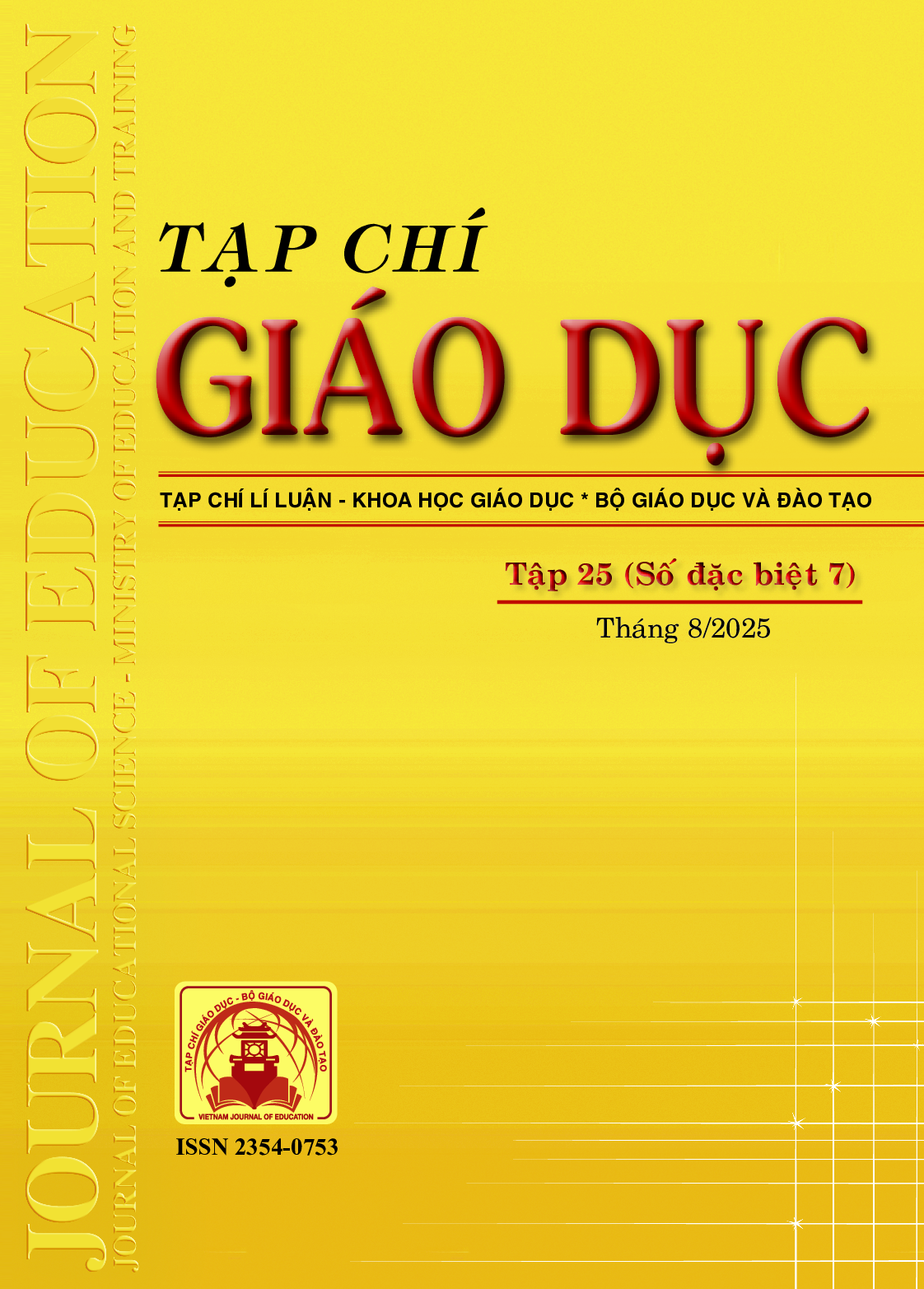Một số khó khăn và đề xuất giải pháp trong đánh giá trực tuyến khi giảng dạy môn Tiếng Anh tại Trường Đại học Cảnh sát Nhân dân
Tóm tắt
The digitalization process in higher education is reshaping teaching and assessment methods, particularly in subjects that require high interaction, such as foreign languages. In this context, implementing online assessment poses many challenges for lecturers, especially at training institutions with special requirements such as the People's Police University. This article aims to identify the outstanding difficulties in the online assessment process and propose appropriate improvement directions. The study employed a qualitative method, conducting in-depth semi-structured interviews with 15 English lecturers at the People's Police University. The results showed five main groups of challenges: (1) Limitations in operating the assessment platform; (2) Difficulty in ensuring authenticity and preventing cheating; (3) Pressure on grading and limited resources; (4) Difficulty in assessing nonverbal skills and group interaction; (5) Lack of theoretical application orientation in assessment design. On this basis, the study proposes several solutions: organizing training on assessment technology capacity, designing authentic assessment tools, applying real-time assessment, and developing comprehensive assessment forms, such as e-portfolios, group presentations, and peer feedback. The application of the TPACK model, combined with the digital version of Bloom's Taxonomy and the SAMR model, is emphasized as a crucial theoretical basis to help lecturers enhance the quality of digital assessment in English.
Tài liệu tham khảo
Adedoyin, O. B., & Soykan, E. (2020). Covid-19 pandemic and online learning: The challenges and opportunities. Interactive Learning Environments, 31(2), 863-875. https://doi.org/10.1080/10494820.2020.1813180
Adnan, M. (2020). Online learning amid the COVID-19 pandemic: Students perspectives. Journal of Pedagogical Sociology and Psychology, 1(2), 45-51. https://doi.org/10.33902/jpsp.2020261309
Allam, S. N. S., Hassan, M. S., Mohideen, R. S., Ramlan, A. F., & Kamal, R. M. (2020). Online distance learning readiness during COVID-19 outbreak among undergraduate students. International Journal of Academic Research in Business and Social Sciences, 10(5). https://doi.org/10.6007/ijarbss/v10-i5/7236
Bao, W. (2020). COVID ‐19 and online teaching in higher education: A case study of Peking University. Human Behavior and Emerging Technologies, 2(2), 113-115. https://doi.org/10.1002/hbe2.191
Beldarrain, Y. (2006). Distance Education Trends: Integrating new technologies to foster student interaction and collaboration. Distance Education, 27(2), 139-153. https://doi.org/10.1080/01587910600789498
Churches, A. (2009). Bloom's Digital Taxonomy. Australian School Library Association NSW Incorporated.
Elo, S., & Kyngäs, H. (2008). The qualitative content analysis process. Journal of Advanced Nursing, 62(1), 107-115. https://doi.org/10.1111/j.1365-2648.2007.04569.x
Heng, K., & Sol, K. (2021). Online learning during COVID-19: Key challenges and suggestions to enhance effectiveness. Cambodian Journal of Educational Research, 1(1), 3-16. https://doi.org/10.62037/cjer.2021.01.01.02
Kumi-Yeboah, A. (2018). Designing Cross-Cultural Collaborative online learning framework for online instructors. Online Learning, 22(4). https://doi.org/10.24059/olj.v22i4.1520
Malik, S., & Rana, A. (2020). E-Learning: Role, Advantages, and Disadvantages of its implementation in Higher Education. JIMS8I - International Journal of Information Communication and Computing Technology, 8(1), 403. https://doi.org/10.5958/2347-7202.2020.00003.1
Mayring, P. (2014). Qualitative content analysis: theoretical foundation, basic procedures and software solution. Klagenfurt. https://nbn-resolving.org/urn:nbn:de:0168-ssoar-395173
Mishra, P., & Koehler, M. J. (2006). Technological Pedagogical Content Knowledge: a framework for teacher knowledge. Teachers College Record the Voice of Scholarship in Education, 108(6), 1017-1054. https://doi.org/10.1111/j.1467-9620.2006.00684.x
Nguyễn Thị Thu Hằng, Hứa Thị Toàn, Phạm Nguyễn Hồng Ngự, Nguyễn Thị Lan Ngọc (2024). Xu hướng nghiên cứu về đánh giá thực trong giáo dục đại học: Trắc lượng thư mục khoa học từ cơ sở dữ liệu Scopus. Tạp chí Giáo dục, 24(12), 35-40.
Nimavat, N., Singh, S., Fichadiya, N., Sharma, P., Patel, N., Kumar, M., Pandit, N. (2021). Online Medical Education in India-Different Challenges and Probable Solutions in the Age of COVID-19. Advances in Medical Education and Practice, 12, 237. https://doaj.org/article/d1c91d2368874d97b24562f39e248a13
Plaisance, M. (2018). Online course delivery. The TESOL Encyclopedia of English Language Teaching, 1-6. https://doi.org/10.1002/9781118784235.eelt0129
Puentedura, R. R. (2012). The SAMR model: Background and exemplars. http://www.hippasus.com/rrpweblog/archives/000073.html
Rahim, A. F. A. (2020). Guidelines for Online Assessment in Emergency Remote Teaching during the COVID-19 Pandemic. Education in Medicine Journal, 12(2), 59-68. https://doi.org/10.21315/eimj2020.12.2.6
Tan, D. T. H., Lee, C. S., & Goh, W. S. (2007). The next generation of E-Learning. In Advances in distance education technologies series/Advances in distance education technologies (ADET) series (pp. 222-242). https://doi.org/10.4018/978-1-59904-376-0.ch012
Trinh, N. M. T., & Trinh, N. B. (2023). Undergraduates’ Perceptions of Online Assessment in Tertiary Education: A Case Study at Tra Vinh University, Vietnam. Vietnam Journal of Education, 7(3), 357-364. https://doi.org/10.52296/vje.2023.340
Yildiz, Y. (2020). Task-Based Language Teaching: an approach in the spotlight to propel language learning forward. International Journal of Social Sciences and Educational Studies, 7(1). https://doi.org/10.23918/ijsses.v7i1p72
Zou, C., Li, P., & Jin, L. (2021). Online college English education in Wuhan against the COVID-19 pandemic: Student and teacher readiness, challenges and implications. PLoS ONE, 16(10), e0258137. https://doi.org/10.1371/journal.pone.0258137
Đã Xuất bản
Cách trích dẫn
Số
Chuyên mục
Giấy phép

Tác phẩm này được cấp phép theo Ghi nhận tác giả của Creative Commons Giấy phép quốc tế 4.0 .












